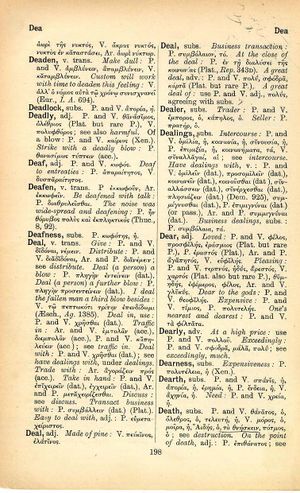dear: Difference between revisions
From LSJ
τὸ δὲ ποιεῖν ἄνευ νοῦ ἃ δοκεῖ καὶ σὺ ὁμολογεῖς κακὸν εἶναι: ἢ οὔ → but doing what one thinks fit without intelligence is—as you yourself admit, do you not?—an evil
(CSV3) |
m (Woodhouse1 replacement) |
||
| Line 1: | Line 1: | ||
{{Woodhouse1 | {{Woodhouse1 | ||
|Text=[[File:woodhouse_198.jpg|thumb|link={{filepath:woodhouse_198.jpg}}]] | |Text=[[File:woodhouse_198.jpg|thumb|link={{filepath:woodhouse_198.jpg}}]] | ||
===adjective=== | |||
[[loved]]: [[prose|P.]] and [[verse|V.]] [[φίλος]], [[προσφιλής]], [[ἐράσμιος]] ([[Plato]] but rare [[prose|P.]]), [[prose|P.]] [[ἐραστός]] ([[Plato]]), [[Aristophanes|Ar.]] and [[prose|P.]] [[ἀγαπητός]], [[verse|V.]] [[εὐφιλής]]. | |||
[[pleasing]]: [[prose|P.]] and [[verse|V.]] [[τερπνός]], [[ἡδύς]], [[ἀρεστός]], [[verse|V.]] [[χαρτός]] ([[Plato]] also but rare [[prose|P.]]), [[θυμηδής]], [[ἐφίμερος]], [[φίλος]], [[Aristophanes|Ar.]] and [[verse|V.]] [[γλυκύς]]. | |||
[[dear to the gods]]: [[prose|P.]] and [[verse|V.]] [[θεοφιλής]]. | |||
[[expensive]]: [[prose|P.]] and [[verse|V.]] [[τίμιος]], [[prose|P.]] [[πολυτελής]]. | |||
[[one's nearest and dearest]]: [[prose|P.]] and [[verse|V.]] [[τὰ φίλτατα]]. | |||
}} | }} | ||
Revision as of 08:52, 20 May 2020
English > Greek (Woodhouse)
adjective
loved: P. and V. φίλος, προσφιλής, ἐράσμιος (Plato but rare P.), P. ἐραστός (Plato), Ar. and P. ἀγαπητός, V. εὐφιλής.
pleasing: P. and V. τερπνός, ἡδύς, ἀρεστός, V. χαρτός (Plato also but rare P.), θυμηδής, ἐφίμερος, φίλος, Ar. and V. γλυκύς.
dear to the gods: P. and V. θεοφιλής.

